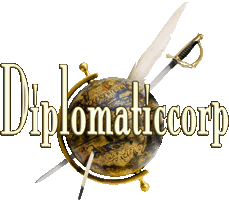A budding historian, in an unknown continent, sets down to write the history of the fall of the Roman Empire and the rebirth of European civilization with a Germanic flavor.
After peace was declared in the year 412, the powers that reigned in Europe followed different paths, and greatness wove its way through their stories like the only girl on a merchant vessel. Much of Europe's wealth lay in the Vandali nation, which had the greatest claim to be the heir of Rome. The fertile fields of Gaul and Lombardy fed Europe's new kingdoms for centuries, and its wine earned the acclaim of even the Ming Emperor himself. The Gothic domain stretched from Anatolia around the Levant and into Africa, while the Saxons developed two separate nations: one stretching the length of the Atlantic coast from Gibraltar to Belgium, and a second dominated the North Sea. The Alamanni, crippled by war and separated into three nations, established small fiefdoms in Greece, catalonia, and crimea. France was established in the southern part of the island of Great Britain, while the Hunni hid amidst the Rus and waited for the moment to return to Europe.
Two centuries after the Great Peace was made, a rising desert power threatened the relative peace. The spread of Islam clove the Gothic nation in two; one identifying itself with the new Turkic migrants and the other called upon its history as a Neo-carthaginian kingdom. Anatolia resisted the advance of Islam, but the southern Gothic kingdom was absorbed into the tide, as was the weakened Alamanni nation in catalonia. Led by the Pontifex, the Vandali managed to fight back the Arab tide with three great battles, one in the Pyrenees, another along the Straits of Messina, and a third in Lakedaemonia to defend that Alamannic territory. A crusade was called, but only the Vandali had the strength to fight in Palestine, and poor relations emerged with the Byzantine Goths, who saw Palestine as rightly-theirs.
In time, the cost of constant war wore on the Vandal Empire, and yet another war started, but this time the contest was fought in the Piedmont as the Gaulic Vandals successfully won their independence from the Italian Vandals. The destruction caused by that war affected the aristocracy in Milan enough that the balance of power within Italy shifted to Florence and a young Medici dynasty. Meanwhile, the North Sea Saxones started raiding their Atlantic cousins. Another great threat came out of Russia; the Hunnic revenge came in the form of Mongol invaders who laid waste to civilizations old and new. The crimean Alamannic nation fell quickly, as did the Byzantine Goths and Arabs. Only the death of the Great Khan saved the Vandali nation, which was weak after centuries of warfare and plague.
Expansion was the word-of-the-century in both Saxon nations and the Frankish fiefdom between them. Being blessed with neither the fertile fields to feed their sons, or the strength of numbers to claim them from Gaul or Italy, the Saxons and French turned to other means of enrichment, first among them the means of finding new trade routes with the wealthy kingdoms of Africa, Arabia, India, and the East. Religion also developed. Dissatisfaction with Rome burst into open war as a monk in Germany, in the void between the Saxons and Vandals, challenged the authority of the Pope in Rome. The ideas spread like wildfire through the Saxon and Frankish nations, and great religious wars laid waste to Gaul.
After the desolation, colonists seeking refuge from Europe left for new nations in the Americas and Africa. Most of the colonists were of Saxon or French origin. The Saxons established colonies in the caribbean, while the French went for North America and the fertile fields they lacked at home. There new nations emerged which challenged the calm, as new battlefields were opened up along with the revival of the Saxon and French rivalry while the Vandal people, content to stay at home, lost out on the imperial power grab. Meanwhile, the Huns quietly grew their Russian nation across Europe and Asia while the eyes of everyone else were turned.
Industrialization emerged, and changed both war and home life. Events unfolded quicker and quicker, and the monarchies of old came under threat from the spread of ideas and information. Great leaders rose and fell, wars emerged and were quickly but bloodily ended. Revolutions came along with the rise of "-isms". Followers of Marx threatened the status quo and succeeded in their aims, albeit in a limited way. Most success came in the nations of Alamannic heritage. New weapons of war brought death efficiently as empires fought total wars in battlefields across the entire world, and as the planet was made smaller, death was made an ever-present threat. Empires, kingdoms, and republics alike sought a means to annihilate their rivals and for one crazy half-century the world lived under the Sword of Damocles, but finally earned the right to take a breath as wiser heads prevailed, but the weapons remain, waiting for the next crisis and the next opportunity to leave desolation in its wake. The one constant in this species at war was the sound of wailing widows.

